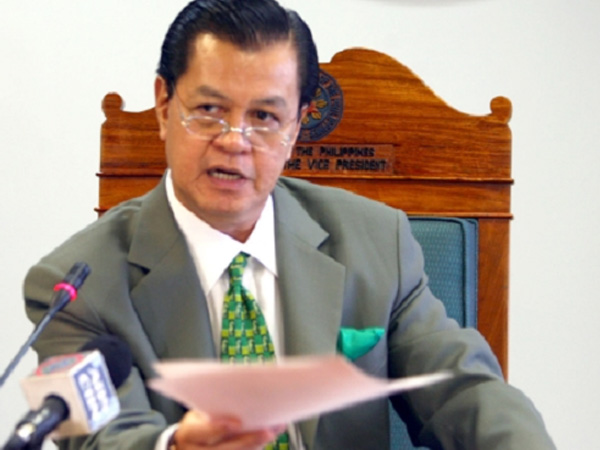Delfin Lee’s Globe Asiatique got ‘special’ deal from Pag-Ibig Fund – CEO
MANILA, Philippines – The head of the Home Development Mutual Fund (HDMF) or Pag-ibig Fund admitted at a Senate hearing on Tuesday that it had a “special arrangement” with Globe Asiatique (GA) Realty Holdings Corp owned by detained businessman Delfin Lee in 2009.
But former Vice President Noli de Castro, who was also chairman of the Housing and Urban Development Coordinating Council (HUDCC), strongly denied that the GA received a special treatment from the Pag-ibig Fund when it obtained alleged questionable loans for its housing projects in Pampanga.
“Wala hong special dito. Walang special treatment, only special program dahil yung project po ay township – may simbahan, may munisipyo may High School, may palengke, may plaza,” de Castro said when he appeared before the Senate committee on urban planning, housing development and resettlement.
(There’s no special here. There’s no special treatment, only special program because the project is township – there is a church, municipality, a high school, a market, a plaza.)
It was Darlene Marie Berberabe, president and chief executive officer of Pag-ibig Fund, who told the committee about what she described as “special arrangement” that the agency had with the GA.
Citing minutes of Pag-ibig board meetings, Berberabe said Pag-ibig agreed to a pilot township development to be implemented by the GA within two years before proceeding to a regular program after evaluation.
Article continues after this advertisementBut during a board meeting in June 2009, she said, the pilot project was being presented as if it was already a “regular program” when there was no evaluation or result yet of the pilot program.
Article continues after this advertisement“Dumiretso na, naging regular na in the sense na nag open ng P5 billion funding commitment in line to be implemented within three years,” Berberabe said.
The new arrangement, she said, was contained in a memorandum of agreement (MOA) signed between the agency and the GA in 2009 during the time of her predecessor, Jaime Fabiaña.
“How many developers do you have with asymmetric relationship… ibig sabihin iba ang relationship nyo sa kanila (It means, you have a different relationship with them)?” Senator Aquilino “Koko” Pimentel III asked.
“Iisa lamang po. Kay GA po (There’s only one, with the GA),” Berberabe said.
“Bakit special? Paano naiiba yung 2009 na arrangement with the GA? Yung pong iba sa Window 1, meron silang buy back period na two years. Sa GA under the MOA, naging 5 years.”
(Why special? How’s the 2009 arrangement with the GA was different? Some of those under Window 1, they have a buy back period of two years. With the GA under the MOA, it became five years.)
“The other developers under the Window 1, yung membership verification na ginagawa ng Pag-ibig is before take out, sa other working group po under the GA agreement is also post. So ibig sabihin pagkatapos ko na ulit –che-check kung member or may mga capacity to pay…Pati po yung mga ITR and income affidavit ay post din…” she further said.
Senator JV Ejercito, chairman of the committee, explained at the start of the hearing that those that fall under Window 1 are developers who have been authorized to process and approve loan applications and even choose the borrowers.
The loan proceeds, he said, will be released seven days after all required documents have been completed.
“Mayroon ditong tinatawag na “buyback guarantee”. Ibig sabihin, kapag hindi nakapagbayad ang borrower, bibilhin ng developer ang account ng borrower na ito sa Pag-Ibig,” Ejercito said.
“Pagkatapos nito, ang property ay maaari na muli ibenta ng developer sa ibang buyer. Maaaring magkaroon ng “buy back” sa unang dalawang taon lamang ng loan,” he further said.
Under Window 2, however, the Pag-Ibig Fund is the one that processes and evaluates housing loan applications.
“Sa window na ito ay may pre-inspection ng housing units, at walang buy-back guarantee ang developer,” Ejercito said.
But De Castro assured that “due diligence” has always been the practice of Pag-ibig board when it approves a certain program.
“Hindi po kami mag-a-approve ng hindi masasagot ng Pag-ibig ang mga katanungan ng members ng board,” he said, responding to Ejercito’s queries.
RELATED STORIES

